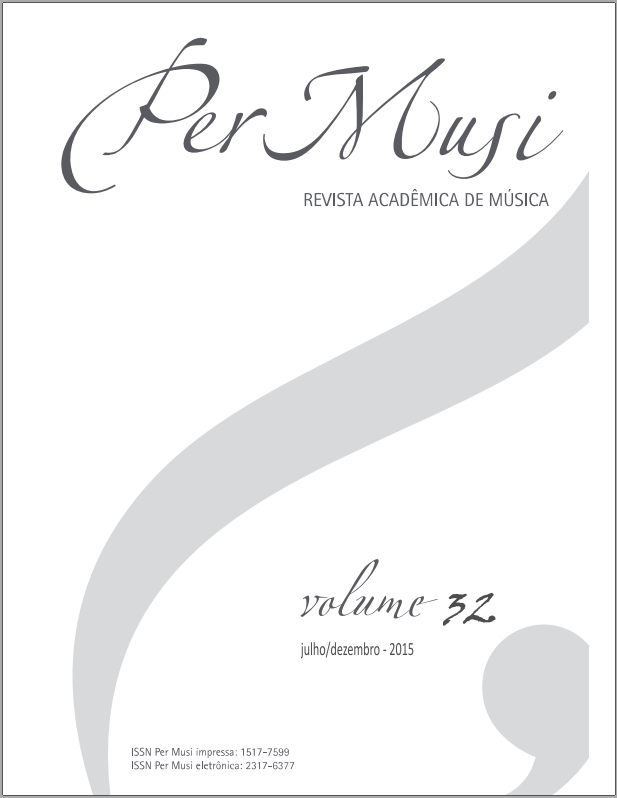As contribuições de Kepler para a continuidade e transformação da tradição da música das esferas
Palavras-chave:
História da ciência, História das idéias, Johannes Kepler, Música das esferas, Música especulativa, Música planetária, Órbitas elípticasResumo
Este artigo deseja trazer a um público mais amplo a importância dos esforços de Johannes Kepler na atualização, modificação, continuidade e transmissão das teorias de correspondências musicais entre os planetas do Sistema Solar e os campos da escala musical. Esta tradição é conhecida como "A Música das Esferas", e sua evolução e desenvolvimento constitui um longo capítulo (de Pitágoras até os dias de hoje) na história das idéias, ciência e teoria musical, através da área conhecida como "música especulativa", que pesquisa as conexões entre a música (especialmente a teoria musical) e o oculto, esotérico ou místico. Como tal, ela justifica mais pesquisas a partir da perspectiva da história das mentalidades (entendida neste caso como uma dupla tomada tanto da musicologia histórica quanto da história da ciência), e esta é precisamente a abordagem que seu trabalho visa.
Referências
CAMPION, N. (2008). A History of Western Astrology. Volume 1, The Ancient World. Londres: Continuum.
CHRISTENSEN, Th., (ed.) (2002). The Cambridge History of Western Music Theory. Cambridge: Cambridge University Press.
COUSTO, H. (2000). The Cosmic Octave: Origin of Harmony. Mendocino, California, EUA: LifeRhythm.
DORCE POLO, C. (2006). Ptolomeo, el astrónomo de los círculos. Madrid: Nivola Ediciones.
FABBRI, N. (2003). Cosmologia e armonia in Kepler e Mersenne: contrappunto a due voci sul tema dell'harmonice mundi. Florencia: Leo S. Olschki.
GENEVA, A. (1995). Astrology and the Seventeenth Century Mind: William Lilly and the Language of the Stars. Manchester: Manchester University Press.
GHYKA, M. (1998). Filosofía y mística del número. Barcelona: Apóstrofe.
GODWIN, J. (1982). “The Revival of Speculative Music”. Musical Quarterly. v. 67#3, p.373-389.
____________ (1986). Music, Mysticism and Magic: A Sourcebook. Nueva York, EUA: Arkana (Penguin).
__________ (1987). Harmonies of Heaven and Earth: the Spiritual Dimensions of Music from Antiquity to the Avant-garde. Rochester, Vermont, EUA: Inner Traditions.
__________ (1989). Cosmic Music: Musical Keys to the Interpretation of Reality. Rochester, Vermont, EUA: Inner Traditions.
__________ (2009). Armonía de las esferas: un libro de consulta sobre la tradición pitagórica en la música. Girona: Atalanta.
GOMBOSI, O. (1951). “Key, Mode, Species”. Journal of the American Musicological Society. v. 4#1, p.20-26.
HAASE, R. (1989). "The Sequel to Kepler's World Harmony." En Godwin, J. (ed.) Cosmic Music: Musical Keys to the Interpretation of Reality. Rochester, Vermont, EUA: Inner Traditions, p. 131-144.
HAASE, R. (1989). "Kepler's World Harmony and Its Significance Today." En En Godwin, J. (ed.) Cosmic Music: Musical Keys to the Interpretation of Reality. Rochester, Vermont, EUA: Inner Traditions, p. 111-130.
HAASE, R. (1989). "Harmonics and Sacred Tradition." En En Godwin, J. (ed.) Cosmic Music: Musical Keys to the Interpretation of Reality. Rochester, Vermont, EUA: Inner Traditions, 1989, p. 91-110.
HASLER, J.F.W. (2005). “La música especulativa”. Ensayos, historia y teoría del arte. v.10, p. 257-277.
KRAEHENBUEHL, D.; SCHMIDT, CH. (1962). “On the Development of Musical Systems”. Journal of Music Theory. v.6:1, p.32-65.
KAYSER, Hans. Textbook of Harmonics. Editado por Joscelyn Godwin. 2 vols. Idlyllwild, California, EUA: Sacred Science Institute, 2006.
KEPLER, J. (1940). “Harmonices Mundi” [1619] en Caspar, M. (ed.), volumen 6 de Gesamte Werke. Munich: Beck.
KEPLER, J. (2005) “Briefe 1607-1611” en Schenkel P.M. (ed.), volumen 16 de Gesamte Werke. Munich: Bayerische Akademie der Wissenschaften.
KEPLER, J. (1997). The Harmony of the World. Translated into English with an Introduction and Notes by E.J. Aiton, A.M. Duncan, & J.V. Field. Philadelphia, Pennsylvania, EUA: American Philosophical Society.
LANDELS, J.G. (1999). Music in Ancient Greece & Rome. Abingdon, Inglaterra: Routledge.
LAUER, H. E. (1989) "The Evolution of Music through Changes in Tone-Systems." En Godwin, J. (ed.) Cosmic Music: Musical Keys to the Interpretation of Reality. Rochester, Vermont, EUA: Inner Traditions, p. 150-167.
MATHIESEN, TH. (2002). “Greek music theory”. En The Cambridge History of Western Music Theory, editado por Thomas Christensen. Cambridge: Cambridge University Press, , p. 109-138.
RISSET, J.C. (2002). “Mathematics and Musical Theory”. En Mathematics and Music: A Diderot Mathematical Forum,. Editado por Gerard Assayag, Hans Georg Feichtinger y José Francisco Rodrigues. Berlin: Springer, p. 215-217.
WALKER, D.P. (1967) “Kepler's Celestial Music”. Journal of the Warburg and Courtauld Institutes v.30, p. 228-250.
WARM, H. (2010) Signatures of the Celestial Spheres: Discovering Order in the Solar System. Forest Row, Inglaterra: Sophia Books.
WARRWAIN, F. (1942). Essai sur l'Harmonices Mundi ou Musique du Monde de Johann Kepler. Paris: Hermann & cie.
Downloads
Publicado
Edição
Seção
Licença
Copyright (c) 2015 Per Musi

Este trabalho está licenciado sob uma licença Creative Commons Attribution 4.0 International License.

Exceto onde está indicado, o conteúdo neste site está sob uma Licença Creative Commons - Atribuição 4.0 Internacional.












